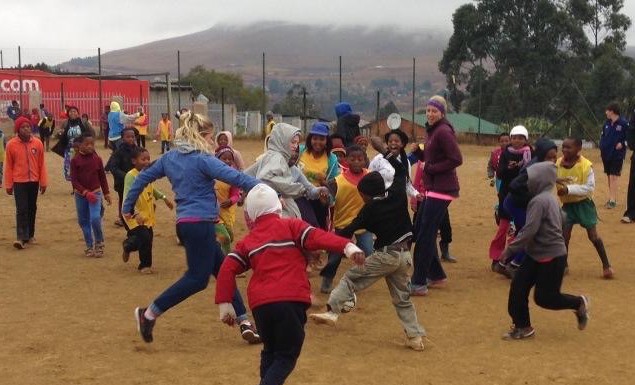“Sport has the power to change the world. It has the power to inspire. It has the power to unite people in a way little else does. It speaks to youth in a language they understand. Sport can create hope where once there was only despair. It is more powerful than government in breaking down racial barriers.” – Nelson Mandela
Freshly painted white lines on grass and sturdy goals with nets, snugly fitting boots, uniform jerseys with names and numbers on the back, a shiny ball pumped up just enough and a smartly dressed referee armed with a whistle. Cracking, uneven, dusty ground, toughened up bare feet, colourful and mismatched thread bare shirts, a ball made from rags or plastic bags and voices shouting over each other in Zulu phrases. It’s hard to believe that these contrasting descriptions refer to the same game. I have been lucky to experience playing in both these extremes; it has solidified my faith in the universality of soccer and how much influence sport can have in people’s lives.
I have fallen in love with South Africa – it really isn’t like anywhere else. The individuality, the beauty, and the unique history of a nation being transformed through arguably the most inspirational and important man who has lived in our lifetime. Mandela day (Saturday 18th July) celebrated the man who brought the people out of apartheid. Nelson Mandela used love over hate, friendship over fear and he realised the unifying power of sports. He stood in a Springbok jersey and handed Francois Pienaar the Rugby World Cup creating a moment of reconciliation and hope which was the birth of the Rainbow Nation. When asked about whether South Africa would play in the cricket World Cup he responded, “Of course we must play”. The revival of this fractured country is an example of how sport enables people to come together and share in the moment – just as we experienced in London as the people of Great Britain came together to host the 2012 Olympic Games.
In Cape Town we were shown around the prison on Robben Island by an ex prisoner who shared stories of their life there. One of the highlights of life there, was the soccer games – even though the prisoners were from different political standpoints, when they played all that mattered was supporting your team and winning that match! Mandela’s vision of using sport to bring blacks and whites together may have been shaped during his time in jail. He later referred to soccer games played on the Island as “more than a game. It can create hope where there was once despair. This game made us feel alive.”
A couple of weeks ago I was lucky enough to be involved in coaching at a soccer camp in Sweetwaters run by a wonderfully passionate and gifted team from Mississippi. In SA children living on the streets or in extreme poverty are very vulnerable; being at risk of poor nutrition, lack of access to healthcare and limited education as well as high risks of abuse and assault. In these places sport is often the way to engage the young people and gradually gain their trust. Many young impoverished children turn to sports, for the simple fact that it keeps them busy.
We were blessed to have the opportunity to run drills and games, Monday to Thursday in the community with over 100 kids turning up every day. As we started to build relationships with these precious people it became possible to offer support addressing issues they are facing such as rape and HIV awareness as well as sharing Bible stories with them and feeding them a substantial lunch. Sport is often one of the few positive things that brighten up these kids’ days. One of the children told us that the annual soccer camp is a huge event in the community. They said “It’s almost like Christmas!” And that sums up what an impact it has, and how much hope something so small can bring.
I thank God that my paths crossed with the amazing coaches I met and that I had the opportunity to be involved in seeing the power of sport in disadvantaged places. My heart has been filled with a renewed passion to use sport to overcome inequalities in broken places and help people to be less marginalised. I believe that sport is inclusive and because of this it shows people how to work hard and play together. I believe that sport offers an education in valuable life skills that can be used to help unite a society and lift communities out of suffering. I believe that it helps people interact socially and builds character. I believe sport can undermine discrimination and can bring hope in the face of oppression. I believe that sport can change lives and nations. I believe in the power of sport!
